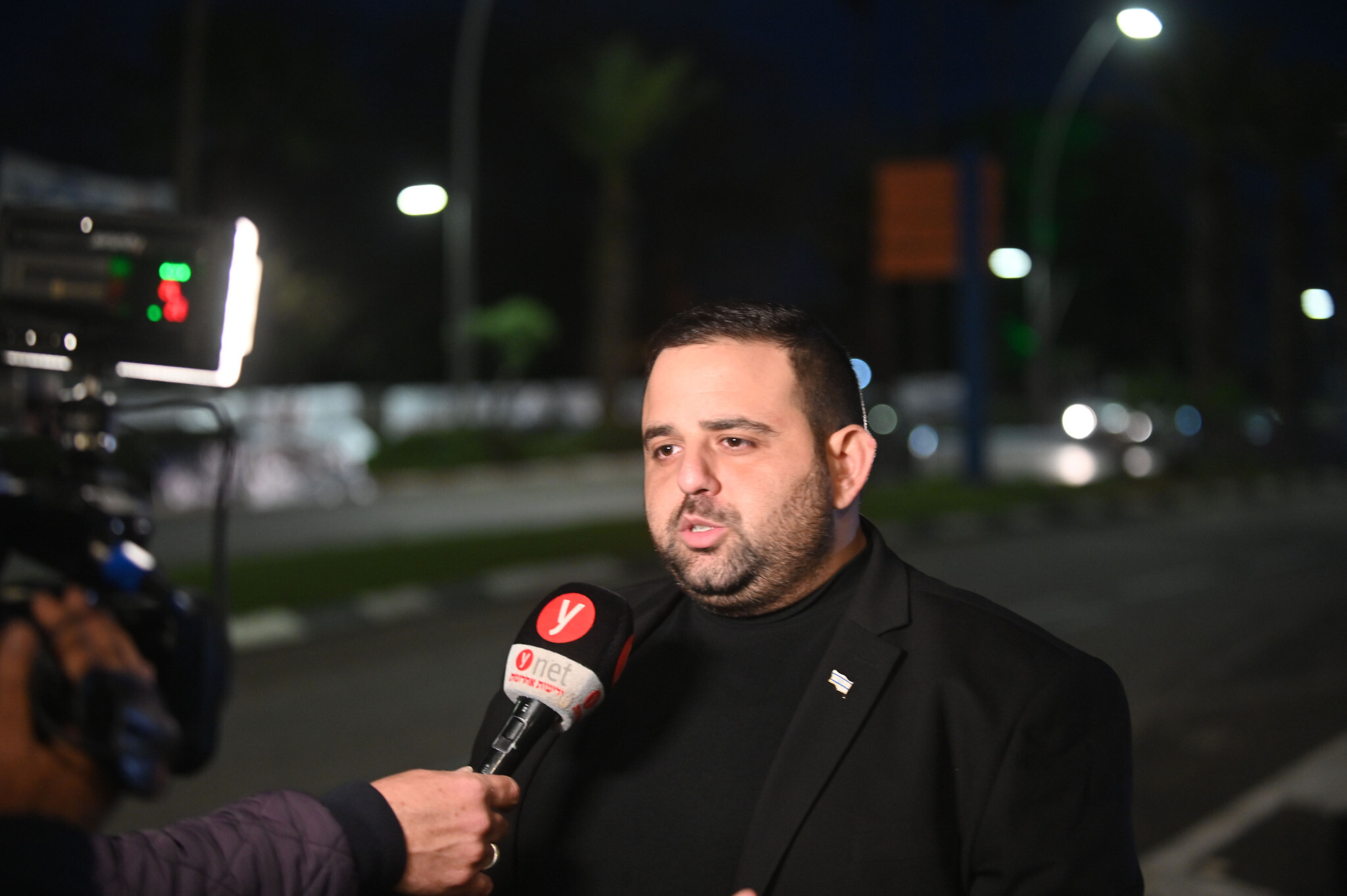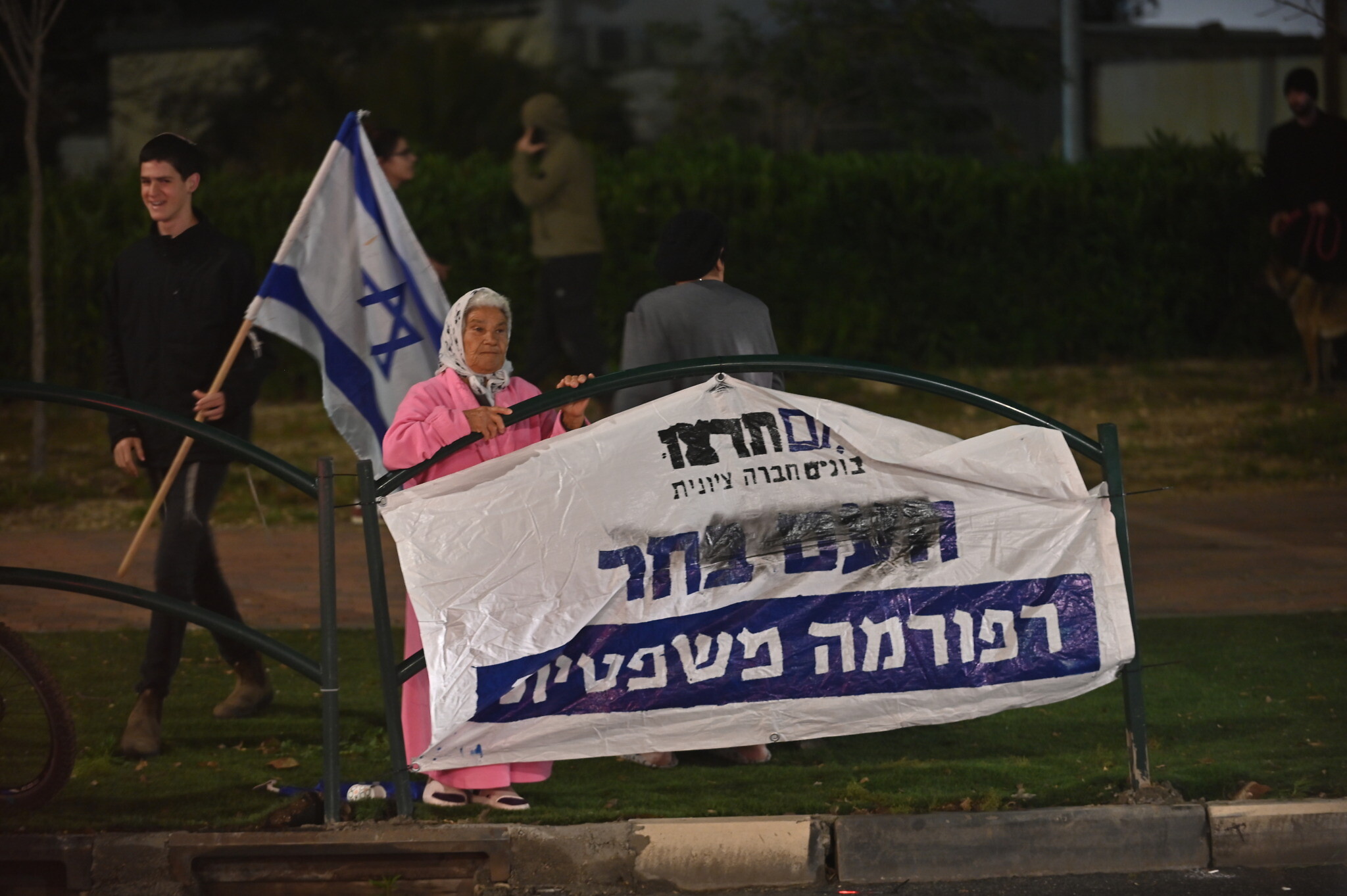Like a general steadying his troops before an enemy onslaught, Haim Barda shouted out orders to a few hundred right-wing protesters gathered Saturday night in a square in Or Akiva.
“Don’t be fazed: The left-wingers are arriving, but reinforcements are en route,” Barda, a taxi driver and right-wing activist, shouted to his people, thinly spread out on one half of Khana Asayag Square. They jeered as across the street, thousands of protesters against the right-wing government’s judicial overhaul marched in from the west, filling the other half of the square and the air with chants about resisting Israel’s perceived slide into dictatorship.
The scene on Saturday night in Or Akiva, an emerging flashpoint for violent confrontations between supporters and opponents of the overhaul, quickly evolved into much more than a heated exchange over some controversial government policy. Fueled by the history and demography of Or Akiva and its environs, the faceoff laid bare the deeper divisions, including socioeconomic gaps and ethnic strife, that have turned a governance dilemma into a clash that is threatening to tear Israeli society asunder.
The arrival on Shabbat of government critics, mostly from out of town and carrying Israeli flags and signs, was a “deliberate provocation, meant to offend religiously on Shabbat, the day of rest, and foment violence,” said Ron Elkobi, a Likud activist from Or Akiva, where the Likud party of Prime Minister Benjamin Netanyahu received 47 percent of the vote in last year’s election.
To many of the thousands of out-of-towners, the arrival in Or Akiva was a response to intimidation and some violence that occurred here last week, when an angry crowd of right-wingers dispersed a far smaller group of anti-overhaul protesters who ventured out as part of the nationwide wave of protests that for the past two months culminates in Saturday nights rallies at major intersections.
The deepening gulf between what is known in right-wing circles as “first Israel” and “second Israel” runs partially along ethnic lines, manifesting in the crisis around the overhaul, in which the Likud-led government is seeking to render the judiciary subservient to the executive branch.

A man approaches anti-overhaul protestors in Or Akiva, Israel on March 26, 2023. (Canaan Lidor)
In few places is the gap felt more strongly than in Or Akiva, a small city whose history began in the 1950s. It sprang into life on the dunes just east of Caesarea as a temporary dwelling for new immigrants, predominantly Sephardic Jews from Arab countries, who were largely penniless and lacking in formal education.
As Caesarea developed into a moneyed resort town – its golf courts and club are rated as Israel’s best – its eastern neighbor remained impoverished, suffering from crime and corruption. Separated by 200 meters, the two cities occupy opposite ends of the socioeconomic spectrum: The median salary in Or Akiva is about NIS 10,000 ($2,780), less than half of Caesarea’s and roughly 17% lower than the national one.
Barda, a father of two in his 50s, is familiar with both worlds. As a taxi driver, he often services Caesarean couples, he said, either to chauffer their children around or take the parents on long, expensive hauls to Tel Aviv so both can drink alcohol on date nights. Barda also owns a horse, a purebred Arabian named Mash’al B, and he mingles with the Caesarea crowd in equestrian shows.

Likud activist Ron Elkobi gives an interview during a rally in Or Akiva on March 26, 2023. (Canaan Lidor)
He is seized by emotion as the first anti-overhaul protesters, who convened at the Caesarea Golf Club, begin crossing over eastward and into the square. Barda’s chummy personality flips as he screams into the bullhorn grievances that no judicial overhaul can address.
“You stole everything from us and left us with nothing! All the finest lands for your kibbutzim! All the good jobs for your darling children! Now you’ve come to take Shabbat? The Square? Are we trash to you? You have come to the wrong place, leftist whores!” he hollered at the anti-overhaul protesters. He was inaudible to them as they chanted, honked, and used anti-car-theft alarms to drown out the other side’s noise.
Approached by The Times of Israel shortly after delivering this diatribe, Barda, his temporal veins throbbing, said hoarsely: “No, brother, I’m not done unloading. Talk to me later.” Eventually, he said: “Never mind the judicial overhaul. I came here to speak of the deeper, underlying issues, the injustice, that the judicial overhaul is a tiny attempt to offset.”
Yoram Sheftel, a well-known lawyer, was among the few speakers at the right-wing rally in Or Akiva who addressed the ethnic divide. Sheftel, who is Ashkenazi, noted the dearth of Sephardic Supreme Court justices as evidence for the need for an overhaul, sparking mild applause. Atta Farhat, a Druze Likud supporter and self-declared Zionist, followed, receiving a warm welcome. He warned that the judiciary had “excessive powers and no accountability. They’re turning us into a dictatorship.”

A woman watches anti-overhaul protesters in Or Akiva, Israel on March 26, 2023. (Canaan Lidor)
The pro-overhaul crowd held up posters of Netanyahu, an Ashkenazi whose private residence is in Caesarea, but who is also the latest in a succession of (Ashkenazi) Likud leaders who have promised to address the perceived disenfranchisement of Sephardic citizens. Organizers played repeatedly a song titled “Bibi ya Habibi” (Arabic for “my buddy”) in the sound amplification system that a local business allowed the rally organizers to use for free.
Meanwhile, hundreds of protesters arrived at the pro-Likud side – the promised reinforcements made up of men who finished their evening prayers, along with some women and teenagers. Anger began swelling in their ranks. A reporter for Channel 13 was shoved out of the pro-Likud side, intimidated, booed, cursed, and called “Al Jazeera.”
The reporter, Tamar Ish-Shalom, said she was kicked and called a “whore.” Barda, who was among the organizers of the pro-Likud counterprotests, said the foul language was “regrettable,” but that there was no violence by the pro-Likud protesters. This reporter was also shoved and cursed briefly. Police arrested three pro-Likud people at the rally for alleged rowdiness, but they were released without charges.
On Saturday, some 30 police officers stood on a traffic island dividing the square, separating the two rallies – a lesson learned from the previous week’s violence.
Some anti-overhaul protesters came in the hope of engaging with locals. Haya Reshef, a 71-year-old recently retired woman from Kfar Saba near Tel Aviv, came “not to shout slogans,” she said, “but to try to explain to the other side that majoritarianism swings both ways and that they could be on the receiving end next, when the other side is the majority.”
She asked police to let her through, but to no avail. She did not fear violence because of her age and the fact that she’s a woman, she said. “I don’t believe they’d beat me up. I’m willing to risk it. Shouting provocations over the police’s heads is depressing and getting us nowhere.”

Haya Reshef, an anti-overhaul protester, demonstrates in Or Akiva, Israel on March 26, 2023. (Canaan Lidor)
Increasingly, Reshef is beginning to think that Israel needs to break up into cantons, “because we don’t share basic values, not even democracy, which the judicial overhaul is destroying,“ she said. “There’s no agreed-upon solution. We’ve passed that point. Soon, the government and the court will issue the police conflicting orders and we’ll see what kind of country we live in.”
The anti-overhaul side had some locals. Golan Levi, 41, said he and his wife, Eliraz, left their six children at home for the evening to speak with protesters “and show them that Or Akiva isn’t all about anger, resentment, and violence.” The Orthodox couple supports judicial reform, they said, though not necessarily the government’s current one. “We’re against intimidation and violence. That’s what we came to show,” Eliraz Levi said.
As both rallies dispersed, the Levis were chatting with Shaul Arama, a 51-year-old engineer-turned-lawyer who lives in Tzofit, an affluent moshav near Kfar Saba, but who was born and grew up in Beit She’an, a predominantly-Sephardic town in the east of the country.
A former Likud voter, Arama said he came to Or Akiva because of last week’s violence, “despite knowing how much it angers and provokes them,” he said. “But this sort of abuse cannot stand here between Jewish citizens of Israel.”
At one point, teenagers from the pro-Likud side began crossing over to the now-empty anti-government side of the square. Wearing balaclavas, they hurled insults at the stragglers, calling them “dogs” and “traitors.”

Anti-overhaul protester Shaul Arama, left, meets pro-overhaul couple Eliraz, right, and Golan Levy in Or Akiva, Israel on March 25, 2023. (Canaan Lidor)
Raising his voice for them to hear, Arama said: “Likud is ruining the country, destroying the army, shattering our democracy and I have a right to come here and say so.”
Was he afraid to say that in Or Akiva while wearing a t-shirt emblazoned with an anti-overhaul slogan?
“What, of that lot?!” he asked dismissively. “No. If I ever am, I’ll know that this country has been lost.”
"conflict" - Google News
March 27, 2023 at 02:35AM
https://ift.tt/NcktiwY
In Or Akiva, social strife driving overhaul conflict rises to the surface - The Times of Israel
"conflict" - Google News
https://ift.tt/9thDisy
https://ift.tt/1uk5Yn9
Bagikan Berita Ini














0 Response to "In Or Akiva, social strife driving overhaul conflict rises to the surface - The Times of Israel"
Post a Comment